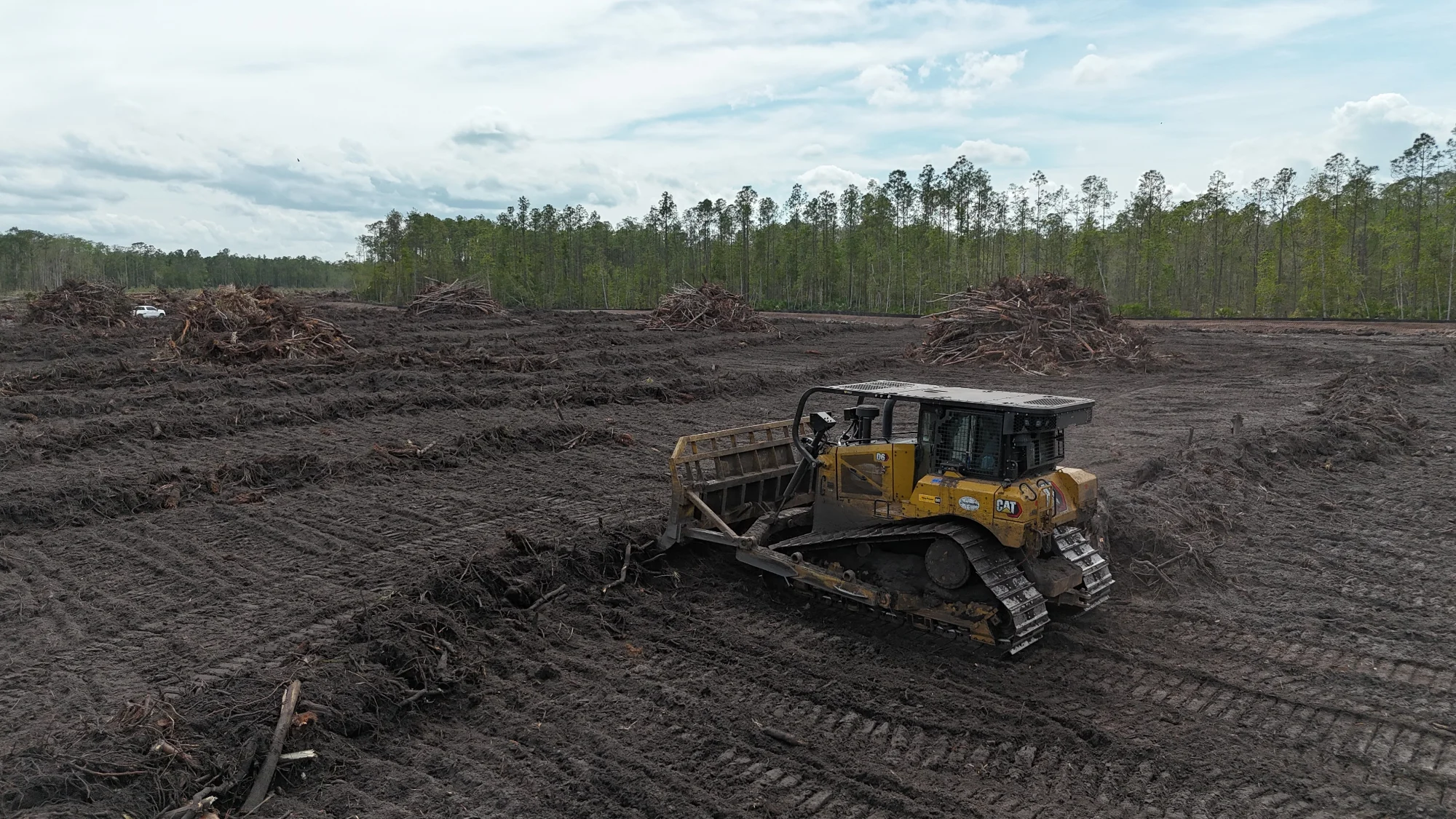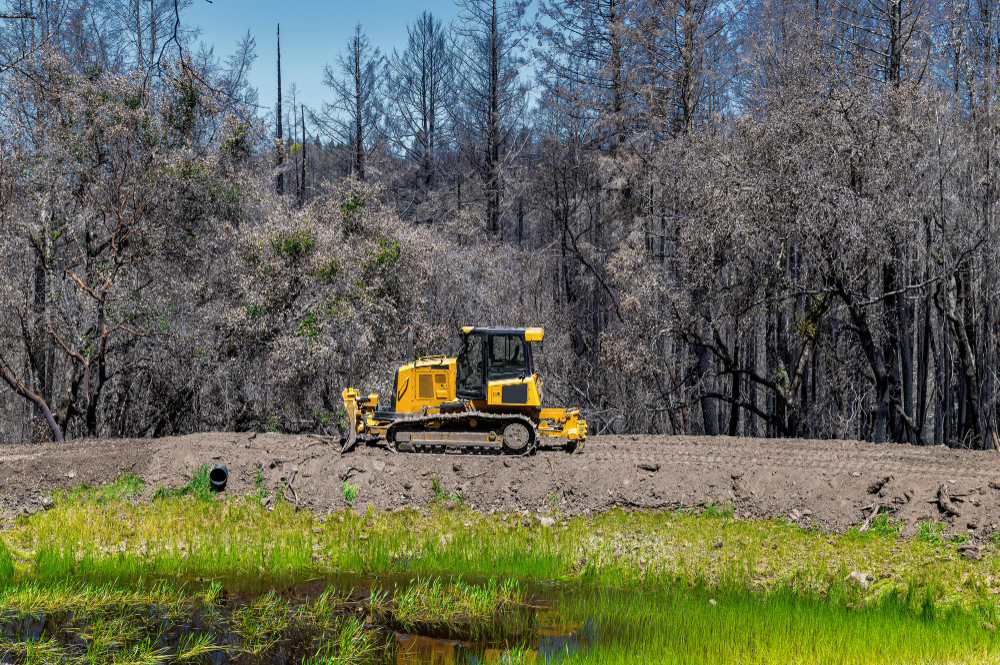

Land clearing projects can quickly turn from straightforward endeavors into costly, time-consuming nightmares. What starts as a simple tree removal can spiral into weeks of delays, budget overruns, and regulatory headaches. The good news? Most setbacks are entirely preventable with proper planning and preparation.
Whether you're preparing for residential construction, commercial development, or agricultural use, understanding the common pitfalls of land clearing can save you thousands of dollars and months of frustration. This guide outlines eight proven strategies that successful property owners use to keep their land clearing projects on track and within budget.
By implementing these tips, you'll minimize delays, avoid regulatory issues, and ensure your project moves smoothly from start to finish.
Timing can make or break your land clearing project. Florida's weather patterns significantly impact how quickly and efficiently work can be completed. The dry season, typically running from November through April, offers the most favorable conditions for land clearing operations.
During these months, equipment can navigate the terrain more easily, and there's less risk of weather-related delays. Heavy machinery performs better on firm, dry ground, and workers can maintain consistent productivity without frequent rain interruptions.
Summer months bring daily thunderstorms and saturated soil conditions that can halt operations for days at a time. Wet conditions not only slow down the work but can also cause soil compaction issues that create long-term problems for your property.
Planning your land clearing during the dry season also means better availability of contractors and equipment. Many land clearing professionals in Orlando, FL schedule their major projects during these optimal months, so booking early ensures you get your preferred timeline.
Permit delays represent one of the most common and frustrating setbacks in land clearing projects. Many property owners underestimate the time required to obtain proper authorizations, leading to significant project delays.
Start the permit process at least 60 days before your planned start date. Different types of clearing require different permits, and some may need approval from multiple agencies. Tree removal near wetlands, for example, often requires environmental permits that can take several weeks to process.
Contact your local building department to understand exactly which permits apply to your specific project. Some areas have strict tree preservation ordinances, while others may require soil erosion control plans. Understanding these requirements upfront prevents costly surprises later.
Keep detailed records of all permit applications and correspondence with regulatory agencies. This documentation helps expedite the approval process and provides crucial reference information if questions arise during the project.
Underground utility strikes cause some of the most expensive and dangerous delays in land clearing. A single damaged gas line, electrical cable, or water main can shut down your project for weeks while repairs are made and safety investigations are completed.
Call 811 (Sunshine State One Call of Florida) at least 48 hours before any digging begins. This free service will mark the location of underground utilities on your property. However, remember that 811 only marks utilities up to the meter – private lines on your property require separate location services.
For comprehensive protection, consider hiring a private utility locating service. These professionals use advanced equipment to identify all underground infrastructure, including private utilities that 811 services don't cover.
Mark any known septic systems, wells, or private electrical lines yourself, and communicate this information clearly to your land clearing contractor. Even small utility repairs can add thousands to your project cost and weeks to your timeline.
Environmental complications can bring land clearing projects to a complete halt. Protected species, wetlands, or contaminated soil discovered mid-project often require extensive remediation before work can continue.
Hire a qualified environmental consultant to assess your property before clearing begins. This professional can identify potential red flags like protected wildlife habitats, wetland areas, or signs of soil contamination that could complicate your project.
In Florida, certain bird species have protected nesting seasons that restrict when clearing can occur. Gopher tortoises, for instance, require special relocation procedures if found on your property. Discovering these issues early allows you to plan accordingly rather than scrambling for solutions mid-project.
Document the environmental assessment thoroughly and share findings with your land clearing contractor. This transparency helps everyone involved understand potential challenges and develop appropriate mitigation strategies.
Using inappropriate equipment for your specific terrain and vegetation type leads to inefficient work and extended timelines. Different clearing projects require different tools, and experienced contractors understand how to match equipment to conditions.
Dense hardwood forests require different equipment than pine plantations or scrub brush areas. Rocky terrain demands specialized attachments, while wetland-adjacent areas may need low-pressure equipment to minimize soil disturbance.
Discuss equipment selection with your contractor during the planning phase. Understanding their approach helps you evaluate their expertise and ensures they're properly prepared for your specific conditions.
Weather conditions also affect equipment selection. What works well in dry conditions may be unsuitable when soil becomes saturated. Flexible contractors who can adapt their equipment choices to changing conditions complete projects more efficiently.
Poor communication between property owners, contractors, and regulatory agencies creates unnecessary delays and misunderstandings. Establishing clear communication protocols at the project's outset prevents many common problems.
Schedule regular progress meetings with your contractor, even if everything appears to be going smoothly. These check-ins allow you to address small issues before they become major problems and ensure everyone remains aligned on project goals and timelines.
Create a single point of contact for all project communications. Having multiple people providing direction or requesting changes creates confusion and can lead to costly mistakes or rework.
Document all decisions and changes in writing. Verbal agreements often lead to misunderstandings, especially when projects extend over several weeks or months. Written documentation protects everyone involved and provides clarity when questions arise.
Unexpected discoveries and changing conditions are common in land clearing projects. Properties that appear straightforward during initial assessment often reveal surprises once work begins.
Plan for at least 15-20% contingency in your budget to handle unforeseen circumstances. This might include additional permits for wetland areas discovered during clearing, disposal costs for contaminated soil, or equipment modifications needed for unexpected terrain conditions.
Discuss potential additional costs with your contractor upfront. Understanding their pricing structure for change orders and unexpected work helps you make informed decisions if circumstances change during the project.
Consider the cost of delays in your contingency planning. If your land clearing is part of a larger construction project, delays can have cascading effects on other contractors and timelines. Factor these potential costs into your planning and decision-making.
Local expertise makes a significant difference in preventing delays and avoiding complications. Contractors familiar with Orlando, FL area regulations, soil conditions, and common challenges complete projects more efficiently than those learning as they go.
Experienced local contractors maintain relationships with permit agencies and understand regional requirements that can streamline the approval process. They also know which environmental issues commonly arise in the area and how to address them effectively.
Verify that potential contractors carry appropriate insurance and licensing for land clearing work in Florida. Uninsured contractors may seem less expensive initially, but they expose you to significant liability if accidents or property damage occur.
Ask for references from recent projects similar to yours. Speaking with previous clients provides valuable insights into the contractor's communication style, reliability, and ability to handle unexpected challenges.
Successful land clearing requires careful planning, proper preparation, and attention to detail. The strategies outlined above help property owners avoid the most common pitfalls that lead to delays and cost overruns.
Remember that investing time in upfront planning pays dividends throughout your project. Rushing to start without proper permits, environmental assessments, and contractor selection often leads to far more significant delays later.
If you need professional land clearing in Orlando, FL, contact Drinkwater & Drinkwater today to get a quote. Their experienced team understands local conditions and regulations, helping ensure your project stays on schedule and within budget.